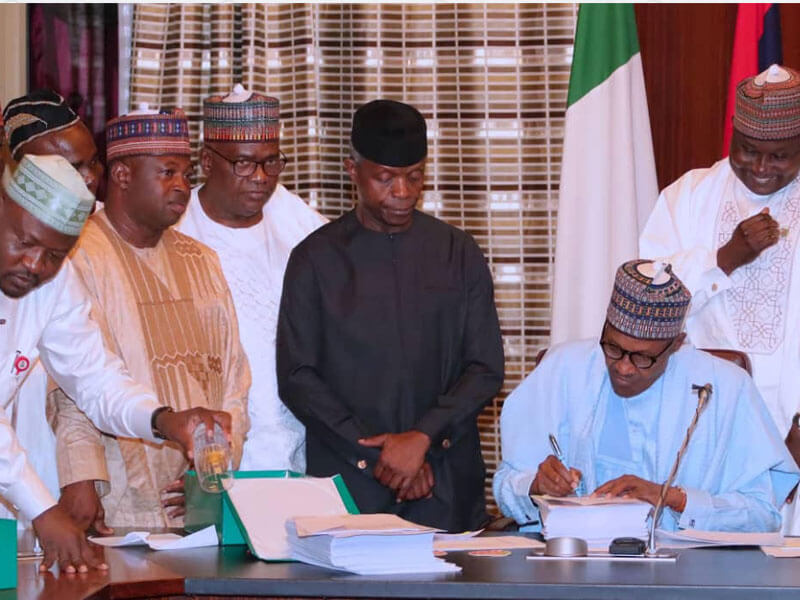- FEC Approves N5.4b for Aviation Security, Gas Parks
The Federal Executive Council (FEC) on Wednesday said it has approved N5.4 billion for the construction of indoor shooting range for aviation security and oil and gas parks.
Mr Timipre Sylva, the Minister for Petroleum and Hadi Sirika, the Minister of Aviation spoke to State House correspondents at the end of the FEC meeting on Wednesday in Abuja.
At the meeting chaired by President Muhammad Buhari, Sylva said the N3 billion approved by FEC for oil and gas parks in the Niger Delta region will help create additional 1000 jobs and improve the security of the region.
He said, “Today at the council, the Ministry of Petroleum presented two memos for the establishment of oil and gas parks. Two oil and gas parks were approved; one in Akwa Ibom, and the other in Bayelsa State.
“These parks are to support the development and manufacturing of oil and gas tools. As some of you know, in some countries, service sector of the oil industry is sometimes even bigger than the oil industry itself.
“In Nigeria, that sector has not really grown so much. Now, this administration is really committed to developing the service sector and that is why the oil and gas parks are being built. These parks will create a lot of jobs; we are looking at about 1,000 additional jobs. And of course, it will improve the security of the Niger Delta.”
Speaking on Deep Offshore Act, the minister said: “Most of these laws are old already and they need to be amended. The amendment of these bills really portends a lot for us. There are a lot of missed opportunities already.
“The previous law provided that when oil prices went beyond $20, we were supposed to negotiate and get some additional revenues. We didn’t take advantage of that and of course, when we approached the oil companies, the oil companies said it’s a lost opportunity; it’s not lost money because this money is not just there; it is not being kept in some cupboard.”
The minister added that the agency is working to recover $62 billion from international companies.
“Well, we have started discussions. Let us consider that as a lost opportunity; the money was not in a cupboard, they have taken it. Nobody can bring out that kind of money. I mean, we can’t get $62bn.
“We can get something from them but not $62bn. It’s an opportunity we have lost. We have already started discussions with them but that is what is clear that it is a lost opportunity really. The amendment of the bill cannot be retroactive. Laws cannot be retroactive; we have to look forward.”
Similarly, Sirika said the N2.4 billion approved for the construction of indoor shooting range for aviation security was in line with the approval for airport officials to bear airms for security purposes.
He said, “Today in council, two memoranda were considered for aviation. The first is the construction of indoor shooting range for aviation security. Recall some time ago, President Buhari, in conformity with the Act that established the Federal Airports Authority of Nigeria, had approved that aviation security personnel should carry arms for improved security and you also recall that these aviation personnel were trained and are still receiving training and profiling and all things that will make them efficient.
“And adding to that, they need tools and equipment to play the role they ought to play to keep us safe and secure. So, a contract was awarded to Messrs Donteck. It is a Nigerian firm (working) in an association with another company called Action Targets of the United States. The total contract sum is two billion, four hundred and thirteen million, nine hundred and sixty three thousand thirty five naira and seventy five kobo (N2,213,963,035.75).
“This includes all of the taxes; and the completion period of course is two months. That has been graciously approved by President Buhari. This is in line with suggestions and recommendations by the UN counterterrorism unit and the International Civil Aviation Organisation.
“The second memorandum that was considered and approved by council today was the ratification of the instrument of International Civil Aviation Organisation Treaties. They are five in number; there is the protocol to amend the convention for the separation of unlawful seizure of aircraft, which is called The Hague Convention of 1970.
“The other one is protocol to amend the convention for the separation of unlawful acts against safety of civil aviation, which is the Montréal Convention of 1971. Another one is the protocol to amend the convention on offences and certain other acts committed on board aircraft. This one also is called the Montréal Protocol of 2014.
“The fourth one is protocol to amend Article 50 (a) of the convention on International Civil Aviation Organisation, ICAO, called the Chicago Convention of December 1944. The fifth one is the protocol to amend Article 56 of the Convention of International Civil Aviation Organisation, the ICAO Convention, December 1944, at Montreal. The significance of all of these is to improve safety and security.”

 Forex2 weeks ago
Forex2 weeks ago


 Naira2 weeks ago
Naira2 weeks ago
 Naira4 weeks ago
Naira4 weeks ago
 Company News4 weeks ago
Company News4 weeks ago
 Billionaire Watch1 week ago
Billionaire Watch1 week ago




 Naira2 weeks ago
Naira2 weeks ago




 Naira4 weeks ago
Naira4 weeks ago




 Naira1 week ago
Naira1 week ago






















